2021-2022学年人教版英语中考复习之七年级上册 Units 5~9课件(共121张PPT)
文档属性
| 名称 | 2021-2022学年人教版英语中考复习之七年级上册 Units 5~9课件(共121张PPT) |
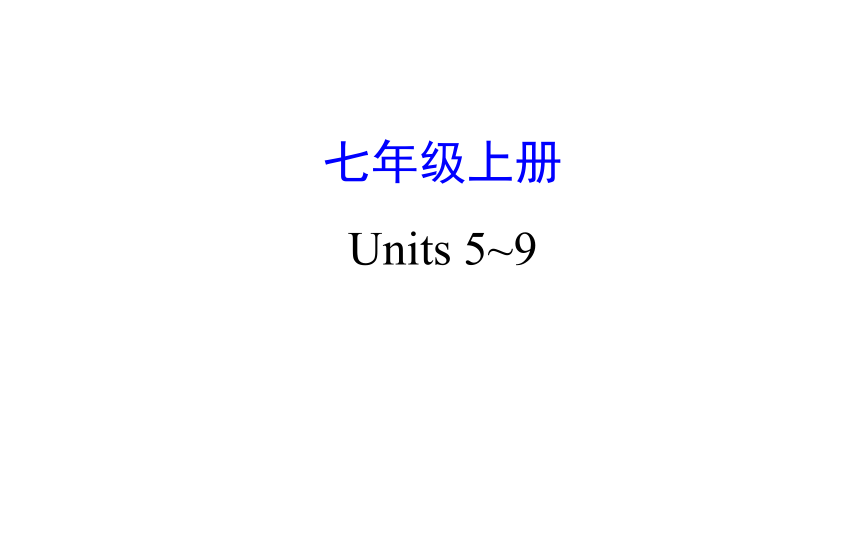
|
|
| 格式 | ppt | ||
| 文件大小 | 1.9MB | ||
| 资源类型 | 教案 | ||
| 版本资源 | 人教新目标(Go for it)版 | ||
| 科目 | 英语 | ||
| 更新时间 | 2021-07-28 00:00:00 | ||
图片预览

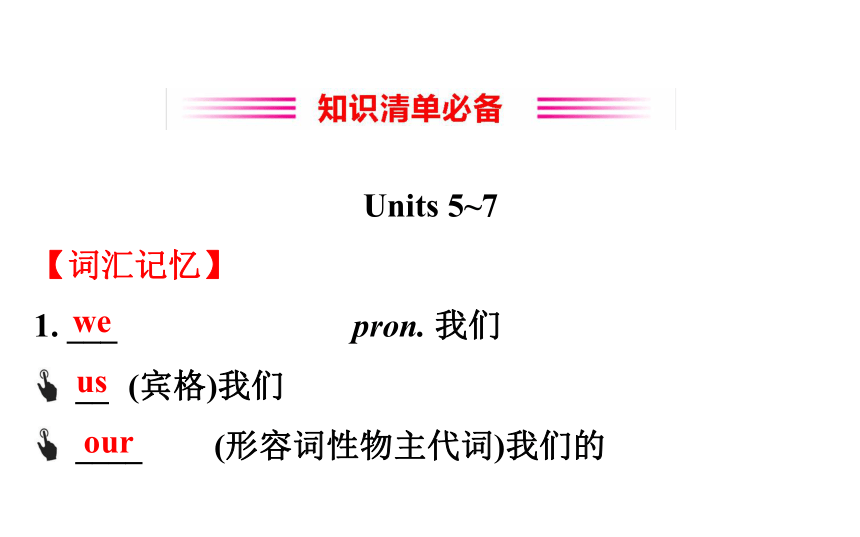
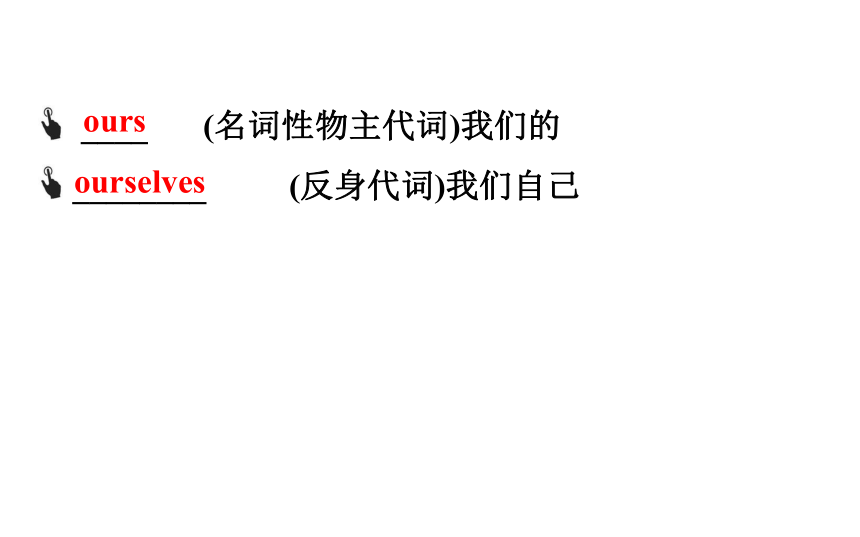
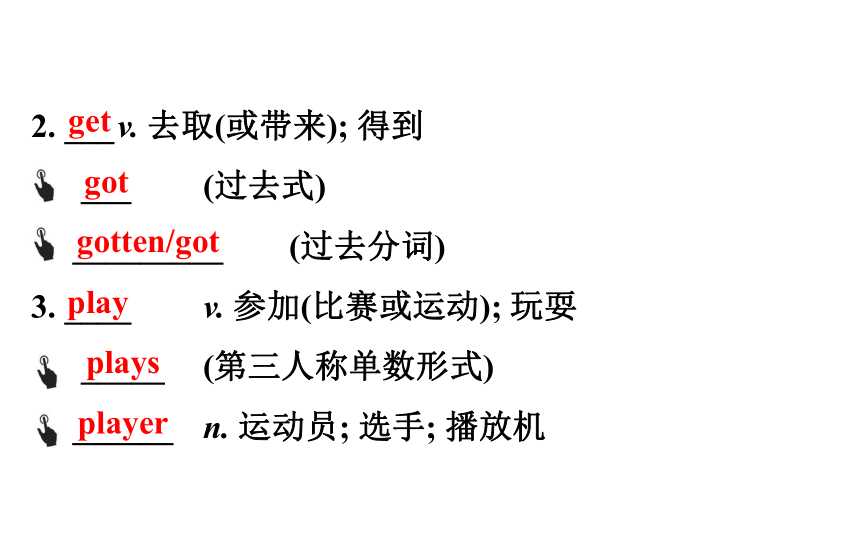
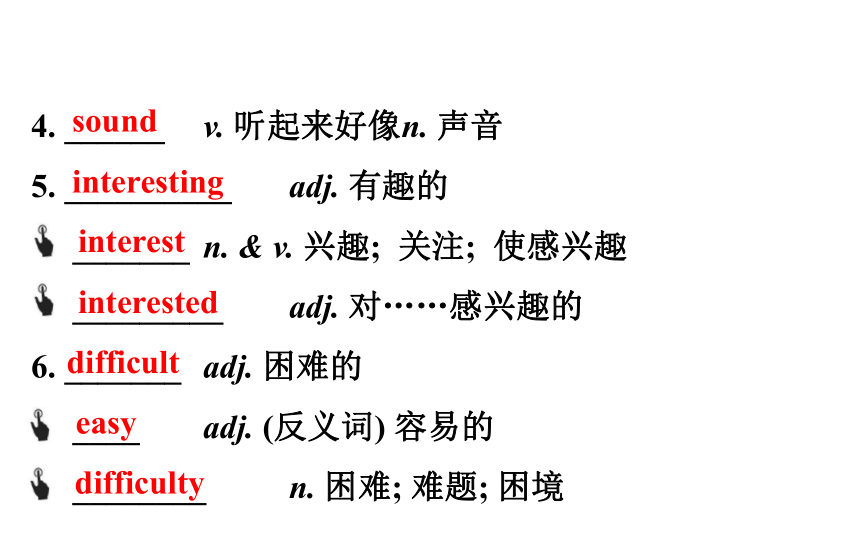
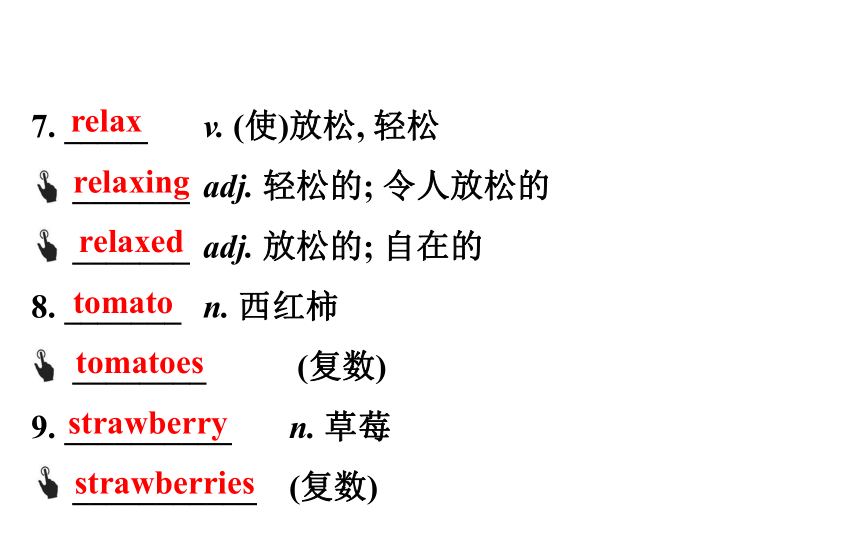
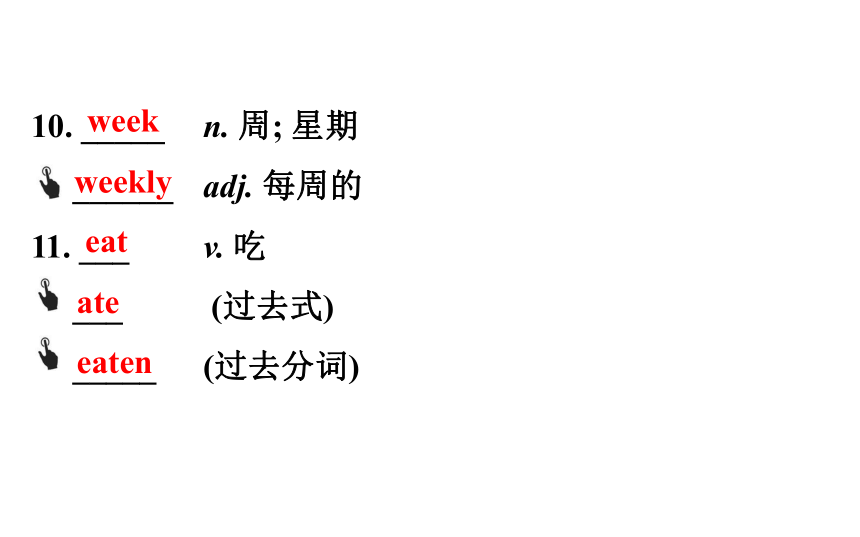
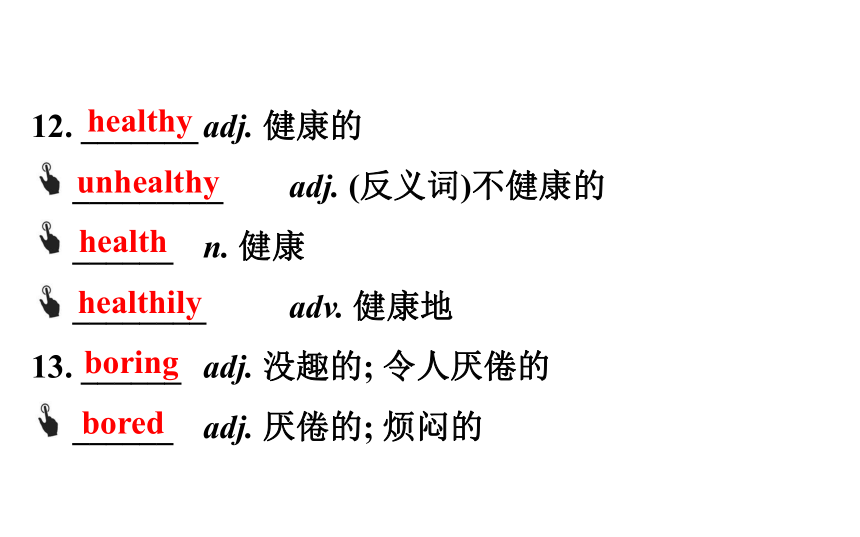
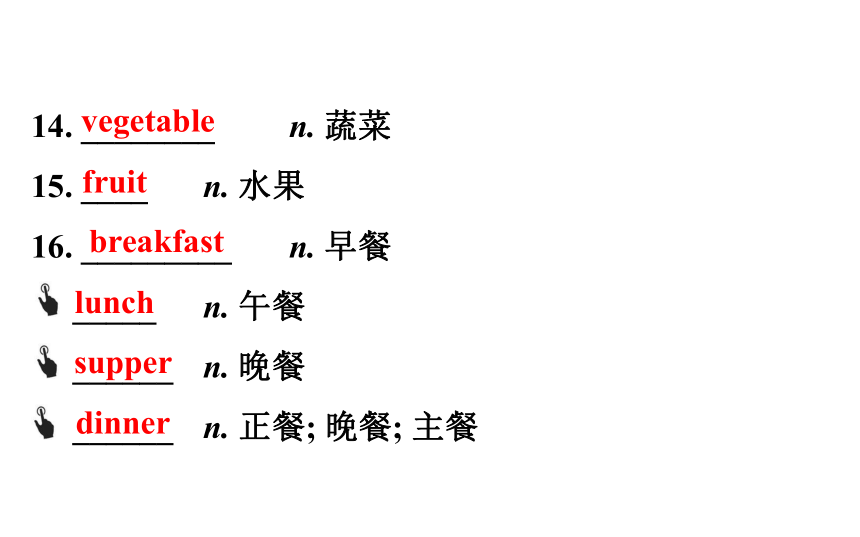
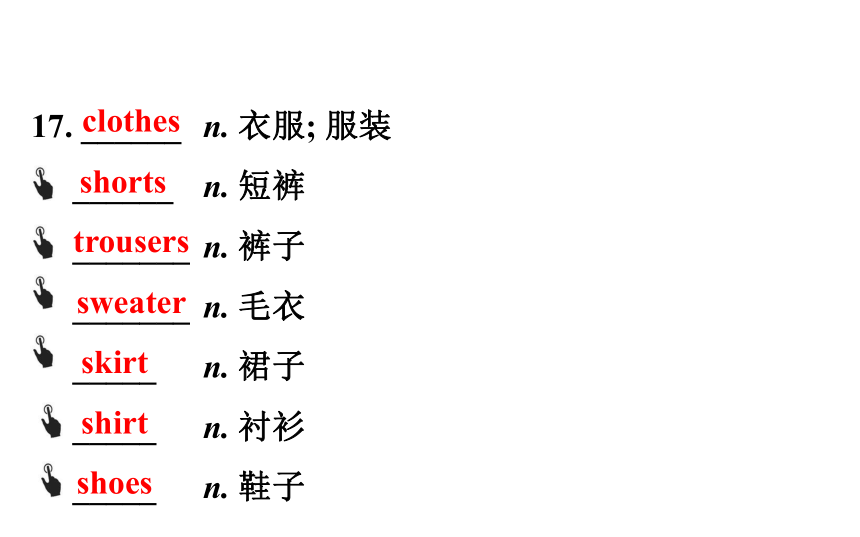
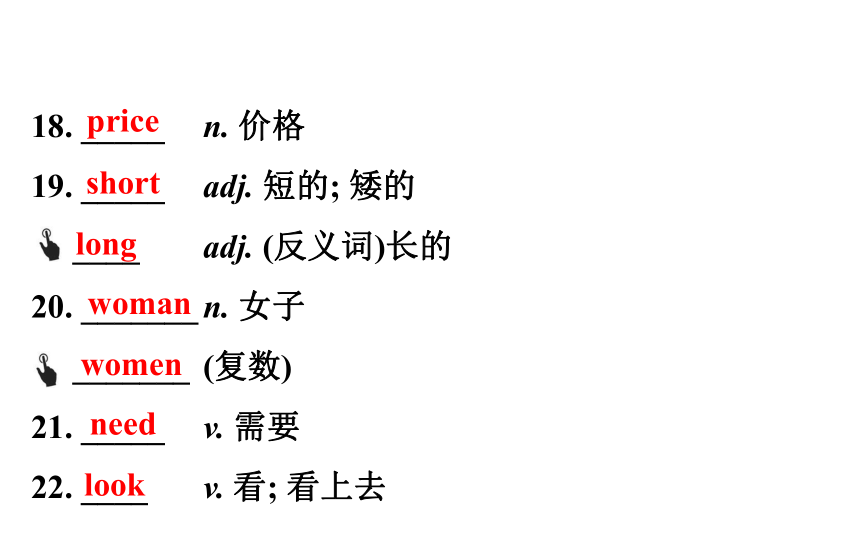
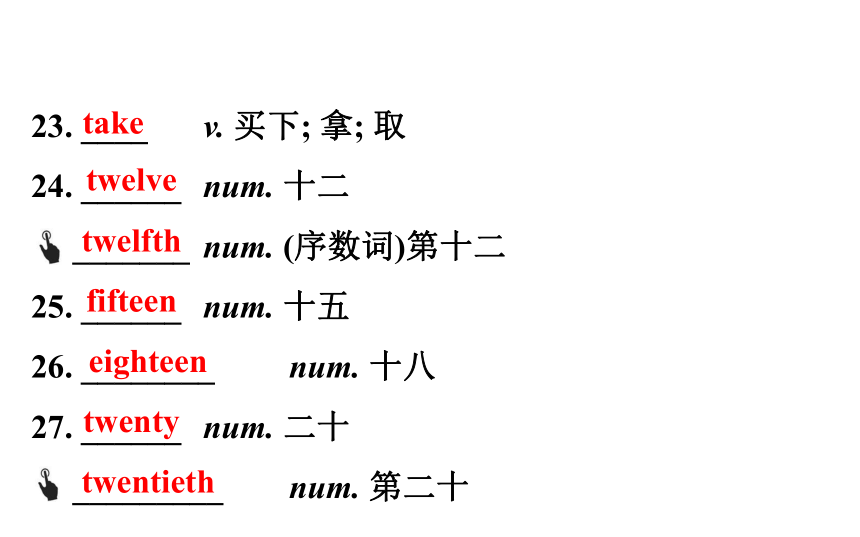
文档简介
七年级上册
Units 5~9
Units 5~7
【词汇记忆】
1. ___ pron. 我们
__ (宾格)我们
____ (形容词性物主代词)我们的
we
us
our
____ (名词性物主代词)我们的
________ (反身代词)我们自己
ours
ourselves
2. ___ v. 去取(或带来); 得到
___ (过去式)
_________ (过去分词)
3. ____ v. 参加(比赛或运动); 玩耍
_____ (第三人称单数形式)
______ n. 运动员; 选手; 播放机
get
got
gotten/got
play
plays
player
4. ______ v. 听起来好像n. 声音
5. __________ adj. 有趣的
_______ n. & v. 兴趣; 关注; 使感兴趣
_________ adj. 对……感兴趣的
6. _______ adj. 困难的
____ adj. (反义词) 容易的
________ n. 困难; 难题; 困境
sound
interesting
interest
interested
difficult
easy
difficulty
7. _____ v. (使)放松, 轻松
_______ adj. 轻松的; 令人放松的
_______ adj. 放松的; 自在的
8. _______ n. 西红柿
________ (复数)
9. __________ n. 草莓
___________ (复数)
relax
relaxing
relaxed
tomato
tomatoes
strawberry
strawberries
10. _____ n. 周; 星期
______ adj. 每周的
11. ___ v. 吃
___ (过去式)
_____ (过去分词)
week
weekly
eat
ate
eaten
12. _______ adj. 健康的
_________ adj. (反义词)不健康的
______ n. 健康
________ adv. 健康地
13. ______ adj. 没趣的; 令人厌倦的
______ adj. 厌倦的; 烦闷的
healthy
unhealthy
health
healthily
boring
bored
14. ________ n. 蔬菜
15. ____ n. 水果
16. _________ n. 早餐
_____ n. 午餐
______ n. 晚餐
______ n. 正餐; 晚餐; 主餐
vegetable
fruit
breakfast
lunch
supper
dinner
17. ______ n. 衣服; 服装
______ n. 短裤
_______ n. 裤子
_______ n. 毛衣
_____ n. 裙子
_____ n. 衬衫
_____ n. 鞋子
clothes
shorts
trousers
sweater
skirt
shirt
shoes
18. _____ n. 价格
19. _____ adj. 短的; 矮的
____ adj. (反义词)长的
20. _______ n. 女子
_______ (复数)
21. _____ v. 需要
22. ____ v. 看; 看上去
short
long
woman
women
need
look
price
23. ____ v. 买下; 拿; 取
24. ______ num. 十二
_______ num. (序数词)第十二
25. ______ num. 十五
26. ________ num. 十八
27. ______ num. 二十
_________ num. 第二十
twelve
twelfth
fifteen
eighteen
twenty
twentieth
take
28. _____ num. 三十
29. ____ v. 购买; 买
30. ___ v. 出售; 销售; 卖
____ n. 特价销售; 出售
thirty
buy
sell
sale
【短语回顾】
1. _________ 网球?
2. ____________ 乒乓球球拍?
3. _________ 迟到?
4. _____________ 打篮球?
5. ___________________ 玩电脑游戏 ?
tennis ball
ping-pong bat
be late for
play basketball
play computer games
6. _________ 看电视 ?
7. ___________________ 去同一所学校上学 ?
8. _________ 下课后?
9. ______________ 生日晚宴?
10. __________ 思考; 思索 ?
11. _____________ 蔬菜沙拉?
watch TV
go to the same school
after class
birthday dinner
think about
vegetable salad
12. _________ 下周?
13. ___________ 饮食习惯?
14. ___________ 健康食物?
15. __________ 体育明星?
16. ________________ 问某人关于某事?
17. ___________ 服装店?
next week
eating habits
healthy food
sports star
ask sb. about sth.
clothes store
18. _______ 大甩卖?
19. _________________ 以非常优惠的价格?
20. ________ 一双?
big sale
at very good prices
a pair of
【句式填写】
1. ——他有一个网球吗?
—_____he _____a tennis ball?
——不, 他没有。
—___, he _______.
Does
have
No
doesn’t
2. 我想打篮球。
I want __ ____ _________.
3. 让我们去找他吧。
_____ ___and find him.
to
play
basketball
Let’s
go
4. ——你喜欢沙拉吗?
—___you ____salad?
——是的, 我喜欢。
—Yes, _ ___.
5. 他不喜欢蔬菜。
He _______ ____vegetables.
Do
like
I
do
doesn’t
like
6. 早餐你喜欢吃什么?
_____do you like ___ _________?
7. 我不想变胖。
I _____ _____to be fat.
8. 这些短袜多少钱?
_____ _____ ___these socks?
What
for
breakfast
don’t
want
How
much
are
9. 我需要一件毛衣上学穿。
I _____a sweater ___ ______.
10. 快来买衣服吧, 我们店服装大减价!
______and ____your clothes __our great ____!
11. 我们卖的所有服装价格都很优惠。
We ___all our clothes __very _____ ______.
need
for
school
Come
buy
at
sale
sell
at
good
prices
12. 我们有绿色的毛衣, 仅售15美元!
We _____green sweaters ___only $15!
13. 短袜三双仅两美元!
Socks ___only $2 ___three _____!
have
for
are
for
pairs
Units 8、9
【词汇记忆】
1. ______ n. 月; 月份
______ n. (形近词)嘴; 口
2. ________ n. 一月
3. _________ n. 二月
month
mouth
January
February
4. ______ n. 三月
5. _____ n. 四月
6. ____ n. 五月
7. _____ n. 六月
8. ____ n. 七月
9. _______ n. 八月
March
April
May
June
July
August
10. __________ n. 九月
11. _______ n. 十月
12. _________ n. 十一月
13. _________ n. 十二月
14. _____ n. 聚会; 晚会
15. ____ num. 第一
September
October
November
December
party
first
16. ______ num. 第二
17. _____ num. 第三
18. ____ num. 第五
19. ______ num. 第八
20. _____ num. 第九
21. _______ n. (音乐、戏剧等的) 会演节; 节日
second
third
fifth
eighth
ninth
festival
22. _____ n. 学期
23. _____ adj. 忙碌的
____ adj. (反义词)自由的; 空闲的
24. _______ adj. ﹠n. (=favourite) 特别喜爱的(人或事
物)
25. _______ n. 学科; 科目
term
busy
free
favorite
subject
26. ______ n. 科学
_______ n. 科学家
27. ______ n. 音乐; 乐曲
_______ adj. 音乐的
28. __________ n. 地理(学)
29. _______ n. 历史
30. ____ adv. 为什么
science
scientist
music
musical
geography
history
why
31. _______ conj. 因为
32. ________ n. 星期一
33. ______ n. 星期五
34. ________ n. 星期六
35. ________ n. 星期二
36. __________ n. 星期三
because
Monday
Friday
Saturday
Tuesday
Wednesday
37. _________ n. 星期四
38. _______ n. 星期日
39. _____ v. 完成; 做好
40. ______ n. 课; 一节课
41. _____ n. 小时
Thursday
Sunday
finish
lesson
hour
【短语回顾】
1. _____________ 生日聚会?
2. __________ 英语测验?
3. __________ 学校郊游?
4. __________ 校庆日 ?
5. ________ 图书销售?
6. __________ 艺术节 ?
birthday party
English test
school trip
School Day
book sale
art festival
7. __________________ 在学校图书馆 ?
8. _______ 无疑; 肯定 ?
9. _________ 上数学课?
10. ____________ 从……到……
11. __________________ 在星期五下午?
in the school library
for sure
have math
from. . . to. . .
on Friday afternoon
【句式填写】
1. 你想来参加我的生日聚会吗?
___you want to _____ __my birthday party?
2. 我们在11月30日举办一次英语聚会。
We _____ ___English party ___November 30th.
3. 你最喜欢的学科是什么?
__________________________?
Do
come
to
have
an
on
What’s your favorite subject?
4. 谁是你的音乐老师?
_____ __your music teacher?
5. 你们什么时候上地理课?
______ __your geography class?
6. 在星期五我很忙。
I ___very _____on Friday.
Who
is
When
is
am
busy
7. 老师说它有用, 但是我认为它难。
The teacher says __ __ ______, but I think __ __
_______.
8. 我的课在(下午)一点五十分结束, 但随后我要上两个
小时的美术课。
My classes _____ __1: 50, ___after that I _____an art
lesson ___two hours.
it
is
useful
it
is
difficult
finish
at
but
have
for
9. ——你为什么喜欢历史?
—_____ ___you ____history?
——因为它很有趣。
—_______it’s interesting.
10. (表示祝愿)过得愉快!
________________?
Why
do
like
Because
Have a good time!
1. Let’s go! 让我们走吧! (Unit 5, P26)
?Let’s . . . 让我们……
【测考点】
(1)(2018·金华中考) 让我们看一看这些青少年的可能会
改变世界的发明吧。
_________________these teenage inventions that might
change the world. ?
Let’s have a look at
( )(2)(2019·怀化中考)—It’s a nice day today.
Let’s go to the park.
— ?
A. Good idea. B. It doesn’t matter.
C. Thank you.
A
(3)Let’s discuss when to go to the Sea World, _____
___? (完成反意疑问句)
(4)(2017·天水中考) Let us go hiking, ____ ____? (完
成反意疑问句)
shall
we
will
you
【辨不同】
(1)Let’s do . . . 意为“让我们做……吧。”
let’s是let us 的缩写形式, 意为“让我们”。
本句型常用来表示说话人的建议或请求。肯定应答语常用: Good idea. /That sounds good. /OK. /All right. 等; 否定应答语常用: Sorry, I. . .
(2)Let’s. . . 与Let us. . .
用法
反意疑问句
Let’s. . .
用于提出建议, 表示“咱们做某事吧”, 包括对方在内
shall we
Let us. . .
用于请求他人允许, 表示“请让/允许我们做某事”, 不包括对方在内
will you
2. That sounds good. 那听起来不错。(Unit 5, P27)
?sound v. 听起来好像
【测考点】
( )(1)(2018·福建中考·A卷) —Do you enjoy
Chinese folk songs?
—Yes, the folk songs _________nice. ?
A. sound B. smell C. look
A
(2)—Do you like the songs by Taylor?
—Yes. Country music sounds _____(well) and is full
of feelings.
good
(3)选词填空(voice, sound, noise)
①This time she spoke more slowly and there was anger
in her _____.
②It is OK to make _____when you eat noodles in Japan.
③As we know, ______travels more slowly than light.
voice
noise
sound
【巧归纳】 sound的两种词性
【辨不同】sound/voice/noise属不同的“声音”
sound
含义最广, 指可以听到的任何声音
voice
强调“嗓音”, 多指人发出的声音, 包括说话声、歌声和笑声
noise
多指“噪音” “嘈杂声” “吵闹声”, 特指不悦耳, 不和谐的声音
3. I play ping-pong with my classmates. 我和我的同学一起打乒乓球。(Unit 5, P29)
?play v. 参加(比赛或运动); 玩耍
【测考点】
(1)Being afraid that Jack is lonely, his mother wants
to have a second baby to ____________(与他一起玩). ?
(2)微信在人们的工作和生活中起着重要的作用。
WeChat ___________________________people’s work
and life. ?
play with him
plays an important part/role in
(3)他们每天练习打篮球, 最终他们赢得了这次比赛。
They practised ________________every day and they
won the match finally. ?
( )(4)(2018·海南中考)Ann is my best friend. She
can play_________ piano very well. ?
A. / B. a C. the
playing basketball
C
【巧归纳】play的用法
4. I think it’s healthy. 我认为它是健康的。(Unit 6, P35)
?healthy adj. 健康的
【测考点】
(1)Milk is good for your ______, but drinking too much
is _________(health).
(2)(2019·武威、白银中考)保持健康对每个人而言都很
重要。
It’s very important for everyone to ___________
_______. .
health
unhealthy
keep/stay/be
healthy
( ) (3)(2018·湘潭中考)—Mum, I’d like a cup of
coffee.
—Dear, why not drink some water? It’s _________
than coffee. ?
A. healthy B. healthier
C. the healthiest
B
【巧归纳】与health“健康”相约
(1)health为名词, 意为“健康”。
(2)healthy为形容词, 意为“健康的”。
(3)healthily为副词, 意为“健康地”。
(4)unhealthy为形容词, 意为“不健康的”。
【一言辨异】Eating healthy food and keeping away from unhealthy food are good for our health, so we must eat healthily every day.
吃健康的食物, 远离不健康的食品对我们的健康有益, 所以我们每天都要健康地饮食。
5. How much are these socks? 这些短袜多少钱? (Unit 7, P37)?
?how much(购物时)多少钱
【测考点】
(1)(2018·白银中考)The sweater is 20 dollars. (对画线部分提问)?
_____ _____is the sweater?
How
much
(2)How much is the English-Chinese dictionary? (改为
同义句)
①_____ _____does the English-Chinese dictionary
____?
② What’s ___ _____ __the English-Chinese dictionary?
How
much
cost
the
price
of
(3)你想要多少苹果?
_____ _____apples do you want?
(4)我们需要多少牛奶?
_____ _____milk do we need?
How
many
How
much
【巧归纳】 询问价格的常见句式
【辨不同】“多少”的区别
how much
询问数量, 意为“多少”, 修饰不可数名词
how many
询问数量, 意为“多少”, 修饰可数名词复数
6. I’ll take it. 我买下它了。(Unit 7, P38)
?take v. 买下; 拿; 取; 花费; 乘坐
【测考点】
(1)(2018·荆门中考) 我决定乘坐公共汽车去南方的沿海
地区进行有趣的旅行。
I decided to ____ __ ____to the south coast for an
interesting trip.
take
a
bus
(2)我们认为你最好按时吃药。
We thought it better for you to ____ ___ ________on
time.
(3)你量过他的体温了吗?
Did you ____ ___ ___________?
take
the
medicine
take
his
temperature
( )(4)(2018·襄阳中考)—Is your brother at home?
I want to tell him about our picnic.
—Oh, he is out at the moment. Can I_________ a
message for him? ?
A. find B. give C. take D. bring
C
( )(5)(2019·滨州中考)—Tom, _________the
umbrella with you. Look at the dark sky. It’s going to
rain. ?
—Thank you, dad.
A. take B. wear C. use D. make
A
【巧归纳】 take的一词多义
【辨不同】bring与 take“带”的方向不同
bring
指从别处把某人或物“带来”或“拿来”
take
指把某人或物“带走”或“拿走”(到别处)
7. My birthday is on May 2nd. 我的生日在5月2日(Unit 8, P43)
?on prep. 在……上
【测考点】
用介词in/on/at填空。
(1)—What time do you usually get up on weekends?
—I usually get up __8 o’clock __the morning.
(2)Mother’s Day is ___the second Sunday __May.
at
in
on
in
(3)The famous physicist Stephen Hawking was born in
Oxford, England in January, 1942 and died ___March
14th, 2018.
on
【辨不同】
词 汇
区 别
on
用在具体某一天或具体某一天的某一段时间前面
in
用在年、月、季节以及一天的早上、下午、晚上等前面
at
用在时刻前面以及固定短语
8. We have some interesting and fun things for you this term.
本学期我们为大家安排了一些有趣又好玩的活动。(Unit 8, P47)
?interesting adj. 有趣的 fun adj. 有趣的; 使人快乐的 n. 乐趣; 快乐
【测考点】
(1)It is very __________(interest) to learn English with
foreign students every day.
(2) People are not _________(interest) in movies
anymore.
(3)他养成了对科学的兴趣。
He developed ___ _______in science.
interesting
interested
an
interest
( )(4)(2018·葫芦岛中考)My father thinks writing is
as _________as reading. .?
A. interesting
B. interested
C. more interesting
D. more interested
A
(5)Jack is a fun boy. We always have fun _______(talk)
with him.
(6) What ___(fun) it is to watch a movie at the weekend!
talking
fun
【辨不同】
interesting和interested的“兴趣”有别
interesting
在句中既可作定语, 同时还可作表语。作表语时, 句子的主语为表物的代词或名词
interested
在句中只能作表语, 其主语为表人的代词或名词
【巧归纳】 与fun有关的常见搭配
(1)have fun(=enjoy oneself=have a good time) 过得愉快
(2)have fun doing sth. 乐意做某事
【警示】fun作名词时, 还可表示“有意思的人; 逗人开心的人; 有趣的人”, 在这种用法中, fun 前面可搭配great, good等词。
9. I like Monday because I have P. E. and history. 我喜欢星期一, 因为我上体育课和历史课。(Unit 9, P50)
?because conj. 因为
【测考点】
(1)Helen was late for school this morning _______(因为)
her clock didn’t ring loudly.
(2)学校运动会因为大雨将被推迟。
The school sports meeting will be put off _________the
heavy rain. ?
because
because of
( )(3)David didn’t go to work yesterday _________
he was ill. ?
A. so B. if
C. because D. though
C
【辨不同】because与because of
because
连词
后接表示原因的从句, 语气较强, 可以回答why引导的特殊疑问句, 不可与so连用
because
of
介词
短语
后跟名词、代词或动名词作宾语, 可置于句首或句末
【警示】在英语中, because(因为)和so(所以)不能同时出现在一个句子中。
10. My classes finish at 1: 50, but after that I have an art lesson for two hours.
我的课在(下午)一点五十分结束, 但随后我要上两个小时的美术课。(Unit 9, P53)
?finish v. 完成
【测考点】用所给动词的适当形式填空。
(1)(2018·兰州中考)After finishing _____(do) your
homework, you can have a good rest.
(2)The old car needs ________(mend). You can’t drive
it now.
(3)The little girl practices ________(speak) English
every day.
doing
mending
speaking
(4)It is too hot now. I feel like ________(drink)
something cool.
(5)We couldn’t help ________(laugh) when we heard the funny story.
(6)All the students in our class are busy _________
(prepare) for the exam. .
drinking
laughing
preparing
【巧归纳】 finish后跟动名词作宾语, 不能跟不定式作宾语。即finish doing sth. “完成做某事”。
【助记】巧记只能跟动名词作宾语的动词(短语)
完成、实践、值得、忙
(finish, practice, be worth, be busy)
继续、习惯、放弃
(keep, be used to, give up)
考虑、建议、不禁、想要
(consider, suggest, can’t help, feel like)
喜欢、思念、介意
(enjoy, miss, mind)
语法点一 一般现在时
→见语法精讲强化篇P197
考点1: 一般现在时的用法。
考点2: 谓语动词的形式: 主语为第三人称时, 谓语应该使用第三人称单数形式。
考点3: 一般现在时的句式转换。
考点4: 与其他时态的辨析。
【即时冲关】
用所给动词的适当形式填空
1. My sister ______(study) English in college.
2. John likes playing soccer very much and he ______
(spend) about one hour playing it every day.
studies
spends
3. In winter, the days ___(be) short and the nights ___
(be) long.
4. Now my father _____(ride) his bike to work every
day instead of driving.
5. We’ll go out to play basketball if it ___________(not
rain) tomorrow. ?
are
are
rides
doesn’t rain
语法点二 基数词与序数词
→见语法精讲强化篇P178
考点1: 基数词的用法。
考点2: 序数词的用法。
考点3: 基数词与序数词的转换。
【即时冲关】根据句意及所给汉语提示完成句子
1. There are about _____________(三百) people planting
trees on the hill. ?
2. Mike is in his _____(第三) year in this middle school
now.
3. __________(五分之四) of the students in our class
have heard about the trip. ?
three hundred
third
Four fifths
4. November is the ________(第十一) month of a year.
5. What happened? There are ___________(数千)
people crowding round there. ?
6. I often get up at ___________________________(6:
45) in the morning. ?
7. Tree-planting Day is on ________________________
____(三月十二日) every year. ?
eleventh
thousands of
a quarter to seven/six forty-five
the twelfth of March/March
12th
8. The number after thirty-nine is _____(四十).
9. Yesterday my father had his _______(第四十)
birthday. We had a birthday party.
10. It will take us ______________________________
_____(一个半小时) to walk there. ?
forty
fortieth
a half
one and a half hours/one hour and
语法点三 特殊疑问句
→见语法精讲强化篇P207
考点1: 特殊疑问词的选用。
考点2: 特殊疑问句的回答。
考点3: 特殊疑问句的语序。
【即时冲关】
根据答语, 完成下列问句
1. —_______your favorite subject?
—My favorite subject is math.
2. —_____does he like art? —Because it’s fun.
3. —_____is your science teacher?
—My science teacher is Mr Wang.
What’s
Why
Who
4. —_____is it going? —Not bad.
5. —______is your brother’s birthday?
—It’s on September 10th.
6. —________my schoolbag? —It’s on the desk.
7. —__________is your jacket? ?
—It’s white.
How
When
Where’s
What color
8. —________are you? —I’m twelve. ?
9. —__________is your sweater? ?
—Ten dollars.
How old
How much
话题——日常活动
考查角度
1. 介绍喜欢的运动;
2. 介绍饮食习惯;
3. 谈论喜好等。
考查频次
★★★★★
【写作佳句】
亮点句式
1. I like playing sports. 我喜欢做运动。?
2. My favorite sport is basketball.
我最喜欢的运动是篮球。
3. We have sports for about an hour every day. ?
每天我们进行大约一个小时的体育运动。
4. Never spend too much time on the Internet. ?
不要花费太多的时间上网。
5. We should eat healthy food and take more exercise. ?
我们应当吃健康的食物, 而且要多锻炼。
万能句式
1. Practice makes perfect.
熟能生巧。
2. A journey of a thousand miles begins with a single step.
千里之行, 始于足下。
3. A walk after meal makes you live longer.
饭后百步走, 活到九十九。
4. An apple a day keeps the doctor away.
一天一个苹果, 医生远离我。
5. The first wealth is health.
健康是人生的第一财富。
【典题研析】
(2018·乐山中考)现在, 戴眼镜的学生越来越多, 为此, 国家把每年 6 月 6 日定为爱眼日。请你结合自己的体会, 就如何爱护眼睛, 给校报英语栏目写一篇短文。内容包括:
1. 吃有益于眼睛的食物, 如胡萝卜、鸡蛋等。
2. 多做眼保健操, 长时间学习后可看看远方。
3. 养成良好的用眼习惯, 如不躺着玩手机或看书等。
注意: 1. 词数 80 个左右; 2. 可适当增加细节, 以使行文连贯; 3. 开头已给出, 不计入总词数。
Nowadays, more and more students are getting near-sighted, so National Eye Care Day is set on June 6 every year. __________________________________
_____________________________________________
_____________________________________________
______________________________________________
Step 1?“四定”审题
(1)定文体: 介绍如何爱护眼睛, 文体为_______。
(2)定人称: 由于是结合自己的经历, 所以本文应以_____
_____为主。
(3)定时态: 介绍方式方法, 应使用___________。
说明文
第一
人称
一般现在时
(4)定要点: ①眼睛的重要性——眼睛是心灵的窗户;
②吃有益于眼睛的食物, 如胡萝卜、鸡蛋等; ③多做眼保健操, 长时间学习后可看看远方; ④养成良好的用眼习惯, 如不躺着玩手机或看书等。
Step 2?段落谋篇
第一段: 点明主题, 指出眼睛的重要性。
眼睛是心灵的窗户。(soul)
_____________________________?
Eyes are the windows to the soul .
第二段: 描写日常保护眼睛的具体措施。
1. 我们要吃有益于眼睛的食物, 如胡萝卜、鸡蛋等。
(be good for)
_______________________________________________
_________________?
2. 多做眼保健操使眼睛放松。
____________________________________?
We should eat some foods that are good for eyes, such
as carrots and eggs.
Do more eye exercises to make eyes relax.
3. 长时间学习后不时看看远方也会有益。(helpful; look
far away)
_____________________________________________
___________________
Also, it’s helpful to look far away from time to time
after studying long. ?
4. 确保养成良好的用眼习惯, 如不躺着玩手机或看书等。
(habit)
___________________________________________
______________________________________________?
Make sure we have a good habit with the eye. For
example, don’t read books or use a cellphone in bed.
第三段: 总结全文, 发出号召。
总而言之, 眼睛是如此重要我们应尽力去保护它们。
(so. . . that)
______________________________________________
____________________________?
In a word, eyes are so important that all of us should
do what we can to protect them.
Step 3?润色成篇
____________________________________________
____________________________________________
____________________________________________
Units 5~9
Units 5~7
【词汇记忆】
1. ___ pron. 我们
__ (宾格)我们
____ (形容词性物主代词)我们的
we
us
our
____ (名词性物主代词)我们的
________ (反身代词)我们自己
ours
ourselves
2. ___ v. 去取(或带来); 得到
___ (过去式)
_________ (过去分词)
3. ____ v. 参加(比赛或运动); 玩耍
_____ (第三人称单数形式)
______ n. 运动员; 选手; 播放机
get
got
gotten/got
play
plays
player
4. ______ v. 听起来好像n. 声音
5. __________ adj. 有趣的
_______ n. & v. 兴趣; 关注; 使感兴趣
_________ adj. 对……感兴趣的
6. _______ adj. 困难的
____ adj. (反义词) 容易的
________ n. 困难; 难题; 困境
sound
interesting
interest
interested
difficult
easy
difficulty
7. _____ v. (使)放松, 轻松
_______ adj. 轻松的; 令人放松的
_______ adj. 放松的; 自在的
8. _______ n. 西红柿
________ (复数)
9. __________ n. 草莓
___________ (复数)
relax
relaxing
relaxed
tomato
tomatoes
strawberry
strawberries
10. _____ n. 周; 星期
______ adj. 每周的
11. ___ v. 吃
___ (过去式)
_____ (过去分词)
week
weekly
eat
ate
eaten
12. _______ adj. 健康的
_________ adj. (反义词)不健康的
______ n. 健康
________ adv. 健康地
13. ______ adj. 没趣的; 令人厌倦的
______ adj. 厌倦的; 烦闷的
healthy
unhealthy
health
healthily
boring
bored
14. ________ n. 蔬菜
15. ____ n. 水果
16. _________ n. 早餐
_____ n. 午餐
______ n. 晚餐
______ n. 正餐; 晚餐; 主餐
vegetable
fruit
breakfast
lunch
supper
dinner
17. ______ n. 衣服; 服装
______ n. 短裤
_______ n. 裤子
_______ n. 毛衣
_____ n. 裙子
_____ n. 衬衫
_____ n. 鞋子
clothes
shorts
trousers
sweater
skirt
shirt
shoes
18. _____ n. 价格
19. _____ adj. 短的; 矮的
____ adj. (反义词)长的
20. _______ n. 女子
_______ (复数)
21. _____ v. 需要
22. ____ v. 看; 看上去
short
long
woman
women
need
look
price
23. ____ v. 买下; 拿; 取
24. ______ num. 十二
_______ num. (序数词)第十二
25. ______ num. 十五
26. ________ num. 十八
27. ______ num. 二十
_________ num. 第二十
twelve
twelfth
fifteen
eighteen
twenty
twentieth
take
28. _____ num. 三十
29. ____ v. 购买; 买
30. ___ v. 出售; 销售; 卖
____ n. 特价销售; 出售
thirty
buy
sell
sale
【短语回顾】
1. _________ 网球?
2. ____________ 乒乓球球拍?
3. _________ 迟到?
4. _____________ 打篮球?
5. ___________________ 玩电脑游戏 ?
tennis ball
ping-pong bat
be late for
play basketball
play computer games
6. _________ 看电视 ?
7. ___________________ 去同一所学校上学 ?
8. _________ 下课后?
9. ______________ 生日晚宴?
10. __________ 思考; 思索 ?
11. _____________ 蔬菜沙拉?
watch TV
go to the same school
after class
birthday dinner
think about
vegetable salad
12. _________ 下周?
13. ___________ 饮食习惯?
14. ___________ 健康食物?
15. __________ 体育明星?
16. ________________ 问某人关于某事?
17. ___________ 服装店?
next week
eating habits
healthy food
sports star
ask sb. about sth.
clothes store
18. _______ 大甩卖?
19. _________________ 以非常优惠的价格?
20. ________ 一双?
big sale
at very good prices
a pair of
【句式填写】
1. ——他有一个网球吗?
—_____he _____a tennis ball?
——不, 他没有。
—___, he _______.
Does
have
No
doesn’t
2. 我想打篮球。
I want __ ____ _________.
3. 让我们去找他吧。
_____ ___and find him.
to
play
basketball
Let’s
go
4. ——你喜欢沙拉吗?
—___you ____salad?
——是的, 我喜欢。
—Yes, _ ___.
5. 他不喜欢蔬菜。
He _______ ____vegetables.
Do
like
I
do
doesn’t
like
6. 早餐你喜欢吃什么?
_____do you like ___ _________?
7. 我不想变胖。
I _____ _____to be fat.
8. 这些短袜多少钱?
_____ _____ ___these socks?
What
for
breakfast
don’t
want
How
much
are
9. 我需要一件毛衣上学穿。
I _____a sweater ___ ______.
10. 快来买衣服吧, 我们店服装大减价!
______and ____your clothes __our great ____!
11. 我们卖的所有服装价格都很优惠。
We ___all our clothes __very _____ ______.
need
for
school
Come
buy
at
sale
sell
at
good
prices
12. 我们有绿色的毛衣, 仅售15美元!
We _____green sweaters ___only $15!
13. 短袜三双仅两美元!
Socks ___only $2 ___three _____!
have
for
are
for
pairs
Units 8、9
【词汇记忆】
1. ______ n. 月; 月份
______ n. (形近词)嘴; 口
2. ________ n. 一月
3. _________ n. 二月
month
mouth
January
February
4. ______ n. 三月
5. _____ n. 四月
6. ____ n. 五月
7. _____ n. 六月
8. ____ n. 七月
9. _______ n. 八月
March
April
May
June
July
August
10. __________ n. 九月
11. _______ n. 十月
12. _________ n. 十一月
13. _________ n. 十二月
14. _____ n. 聚会; 晚会
15. ____ num. 第一
September
October
November
December
party
first
16. ______ num. 第二
17. _____ num. 第三
18. ____ num. 第五
19. ______ num. 第八
20. _____ num. 第九
21. _______ n. (音乐、戏剧等的) 会演节; 节日
second
third
fifth
eighth
ninth
festival
22. _____ n. 学期
23. _____ adj. 忙碌的
____ adj. (反义词)自由的; 空闲的
24. _______ adj. ﹠n. (=favourite) 特别喜爱的(人或事
物)
25. _______ n. 学科; 科目
term
busy
free
favorite
subject
26. ______ n. 科学
_______ n. 科学家
27. ______ n. 音乐; 乐曲
_______ adj. 音乐的
28. __________ n. 地理(学)
29. _______ n. 历史
30. ____ adv. 为什么
science
scientist
music
musical
geography
history
why
31. _______ conj. 因为
32. ________ n. 星期一
33. ______ n. 星期五
34. ________ n. 星期六
35. ________ n. 星期二
36. __________ n. 星期三
because
Monday
Friday
Saturday
Tuesday
Wednesday
37. _________ n. 星期四
38. _______ n. 星期日
39. _____ v. 完成; 做好
40. ______ n. 课; 一节课
41. _____ n. 小时
Thursday
Sunday
finish
lesson
hour
【短语回顾】
1. _____________ 生日聚会?
2. __________ 英语测验?
3. __________ 学校郊游?
4. __________ 校庆日 ?
5. ________ 图书销售?
6. __________ 艺术节 ?
birthday party
English test
school trip
School Day
book sale
art festival
7. __________________ 在学校图书馆 ?
8. _______ 无疑; 肯定 ?
9. _________ 上数学课?
10. ____________ 从……到……
11. __________________ 在星期五下午?
in the school library
for sure
have math
from. . . to. . .
on Friday afternoon
【句式填写】
1. 你想来参加我的生日聚会吗?
___you want to _____ __my birthday party?
2. 我们在11月30日举办一次英语聚会。
We _____ ___English party ___November 30th.
3. 你最喜欢的学科是什么?
__________________________?
Do
come
to
have
an
on
What’s your favorite subject?
4. 谁是你的音乐老师?
_____ __your music teacher?
5. 你们什么时候上地理课?
______ __your geography class?
6. 在星期五我很忙。
I ___very _____on Friday.
Who
is
When
is
am
busy
7. 老师说它有用, 但是我认为它难。
The teacher says __ __ ______, but I think __ __
_______.
8. 我的课在(下午)一点五十分结束, 但随后我要上两个
小时的美术课。
My classes _____ __1: 50, ___after that I _____an art
lesson ___two hours.
it
is
useful
it
is
difficult
finish
at
but
have
for
9. ——你为什么喜欢历史?
—_____ ___you ____history?
——因为它很有趣。
—_______it’s interesting.
10. (表示祝愿)过得愉快!
________________?
Why
do
like
Because
Have a good time!
1. Let’s go! 让我们走吧! (Unit 5, P26)
?Let’s . . . 让我们……
【测考点】
(1)(2018·金华中考) 让我们看一看这些青少年的可能会
改变世界的发明吧。
_________________these teenage inventions that might
change the world. ?
Let’s have a look at
( )(2)(2019·怀化中考)—It’s a nice day today.
Let’s go to the park.
— ?
A. Good idea. B. It doesn’t matter.
C. Thank you.
A
(3)Let’s discuss when to go to the Sea World, _____
___? (完成反意疑问句)
(4)(2017·天水中考) Let us go hiking, ____ ____? (完
成反意疑问句)
shall
we
will
you
【辨不同】
(1)Let’s do . . . 意为“让我们做……吧。”
let’s是let us 的缩写形式, 意为“让我们”。
本句型常用来表示说话人的建议或请求。肯定应答语常用: Good idea. /That sounds good. /OK. /All right. 等; 否定应答语常用: Sorry, I. . .
(2)Let’s. . . 与Let us. . .
用法
反意疑问句
Let’s. . .
用于提出建议, 表示“咱们做某事吧”, 包括对方在内
shall we
Let us. . .
用于请求他人允许, 表示“请让/允许我们做某事”, 不包括对方在内
will you
2. That sounds good. 那听起来不错。(Unit 5, P27)
?sound v. 听起来好像
【测考点】
( )(1)(2018·福建中考·A卷) —Do you enjoy
Chinese folk songs?
—Yes, the folk songs _________nice. ?
A. sound B. smell C. look
A
(2)—Do you like the songs by Taylor?
—Yes. Country music sounds _____(well) and is full
of feelings.
good
(3)选词填空(voice, sound, noise)
①This time she spoke more slowly and there was anger
in her _____.
②It is OK to make _____when you eat noodles in Japan.
③As we know, ______travels more slowly than light.
voice
noise
sound
【巧归纳】 sound的两种词性
【辨不同】sound/voice/noise属不同的“声音”
sound
含义最广, 指可以听到的任何声音
voice
强调“嗓音”, 多指人发出的声音, 包括说话声、歌声和笑声
noise
多指“噪音” “嘈杂声” “吵闹声”, 特指不悦耳, 不和谐的声音
3. I play ping-pong with my classmates. 我和我的同学一起打乒乓球。(Unit 5, P29)
?play v. 参加(比赛或运动); 玩耍
【测考点】
(1)Being afraid that Jack is lonely, his mother wants
to have a second baby to ____________(与他一起玩). ?
(2)微信在人们的工作和生活中起着重要的作用。
WeChat ___________________________people’s work
and life. ?
play with him
plays an important part/role in
(3)他们每天练习打篮球, 最终他们赢得了这次比赛。
They practised ________________every day and they
won the match finally. ?
( )(4)(2018·海南中考)Ann is my best friend. She
can play_________ piano very well. ?
A. / B. a C. the
playing basketball
C
【巧归纳】play的用法
4. I think it’s healthy. 我认为它是健康的。(Unit 6, P35)
?healthy adj. 健康的
【测考点】
(1)Milk is good for your ______, but drinking too much
is _________(health).
(2)(2019·武威、白银中考)保持健康对每个人而言都很
重要。
It’s very important for everyone to ___________
_______. .
health
unhealthy
keep/stay/be
healthy
( ) (3)(2018·湘潭中考)—Mum, I’d like a cup of
coffee.
—Dear, why not drink some water? It’s _________
than coffee. ?
A. healthy B. healthier
C. the healthiest
B
【巧归纳】与health“健康”相约
(1)health为名词, 意为“健康”。
(2)healthy为形容词, 意为“健康的”。
(3)healthily为副词, 意为“健康地”。
(4)unhealthy为形容词, 意为“不健康的”。
【一言辨异】Eating healthy food and keeping away from unhealthy food are good for our health, so we must eat healthily every day.
吃健康的食物, 远离不健康的食品对我们的健康有益, 所以我们每天都要健康地饮食。
5. How much are these socks? 这些短袜多少钱? (Unit 7, P37)?
?how much(购物时)多少钱
【测考点】
(1)(2018·白银中考)The sweater is 20 dollars. (对画线部分提问)?
_____ _____is the sweater?
How
much
(2)How much is the English-Chinese dictionary? (改为
同义句)
①_____ _____does the English-Chinese dictionary
____?
② What’s ___ _____ __the English-Chinese dictionary?
How
much
cost
the
price
of
(3)你想要多少苹果?
_____ _____apples do you want?
(4)我们需要多少牛奶?
_____ _____milk do we need?
How
many
How
much
【巧归纳】 询问价格的常见句式
【辨不同】“多少”的区别
how much
询问数量, 意为“多少”, 修饰不可数名词
how many
询问数量, 意为“多少”, 修饰可数名词复数
6. I’ll take it. 我买下它了。(Unit 7, P38)
?take v. 买下; 拿; 取; 花费; 乘坐
【测考点】
(1)(2018·荆门中考) 我决定乘坐公共汽车去南方的沿海
地区进行有趣的旅行。
I decided to ____ __ ____to the south coast for an
interesting trip.
take
a
bus
(2)我们认为你最好按时吃药。
We thought it better for you to ____ ___ ________on
time.
(3)你量过他的体温了吗?
Did you ____ ___ ___________?
take
the
medicine
take
his
temperature
( )(4)(2018·襄阳中考)—Is your brother at home?
I want to tell him about our picnic.
—Oh, he is out at the moment. Can I_________ a
message for him? ?
A. find B. give C. take D. bring
C
( )(5)(2019·滨州中考)—Tom, _________the
umbrella with you. Look at the dark sky. It’s going to
rain. ?
—Thank you, dad.
A. take B. wear C. use D. make
A
【巧归纳】 take的一词多义
【辨不同】bring与 take“带”的方向不同
bring
指从别处把某人或物“带来”或“拿来”
take
指把某人或物“带走”或“拿走”(到别处)
7. My birthday is on May 2nd. 我的生日在5月2日(Unit 8, P43)
?on prep. 在……上
【测考点】
用介词in/on/at填空。
(1)—What time do you usually get up on weekends?
—I usually get up __8 o’clock __the morning.
(2)Mother’s Day is ___the second Sunday __May.
at
in
on
in
(3)The famous physicist Stephen Hawking was born in
Oxford, England in January, 1942 and died ___March
14th, 2018.
on
【辨不同】
词 汇
区 别
on
用在具体某一天或具体某一天的某一段时间前面
in
用在年、月、季节以及一天的早上、下午、晚上等前面
at
用在时刻前面以及固定短语
8. We have some interesting and fun things for you this term.
本学期我们为大家安排了一些有趣又好玩的活动。(Unit 8, P47)
?interesting adj. 有趣的 fun adj. 有趣的; 使人快乐的 n. 乐趣; 快乐
【测考点】
(1)It is very __________(interest) to learn English with
foreign students every day.
(2) People are not _________(interest) in movies
anymore.
(3)他养成了对科学的兴趣。
He developed ___ _______in science.
interesting
interested
an
interest
( )(4)(2018·葫芦岛中考)My father thinks writing is
as _________as reading. .?
A. interesting
B. interested
C. more interesting
D. more interested
A
(5)Jack is a fun boy. We always have fun _______(talk)
with him.
(6) What ___(fun) it is to watch a movie at the weekend!
talking
fun
【辨不同】
interesting和interested的“兴趣”有别
interesting
在句中既可作定语, 同时还可作表语。作表语时, 句子的主语为表物的代词或名词
interested
在句中只能作表语, 其主语为表人的代词或名词
【巧归纳】 与fun有关的常见搭配
(1)have fun(=enjoy oneself=have a good time) 过得愉快
(2)have fun doing sth. 乐意做某事
【警示】fun作名词时, 还可表示“有意思的人; 逗人开心的人; 有趣的人”, 在这种用法中, fun 前面可搭配great, good等词。
9. I like Monday because I have P. E. and history. 我喜欢星期一, 因为我上体育课和历史课。(Unit 9, P50)
?because conj. 因为
【测考点】
(1)Helen was late for school this morning _______(因为)
her clock didn’t ring loudly.
(2)学校运动会因为大雨将被推迟。
The school sports meeting will be put off _________the
heavy rain. ?
because
because of
( )(3)David didn’t go to work yesterday _________
he was ill. ?
A. so B. if
C. because D. though
C
【辨不同】because与because of
because
连词
后接表示原因的从句, 语气较强, 可以回答why引导的特殊疑问句, 不可与so连用
because
of
介词
短语
后跟名词、代词或动名词作宾语, 可置于句首或句末
【警示】在英语中, because(因为)和so(所以)不能同时出现在一个句子中。
10. My classes finish at 1: 50, but after that I have an art lesson for two hours.
我的课在(下午)一点五十分结束, 但随后我要上两个小时的美术课。(Unit 9, P53)
?finish v. 完成
【测考点】用所给动词的适当形式填空。
(1)(2018·兰州中考)After finishing _____(do) your
homework, you can have a good rest.
(2)The old car needs ________(mend). You can’t drive
it now.
(3)The little girl practices ________(speak) English
every day.
doing
mending
speaking
(4)It is too hot now. I feel like ________(drink)
something cool.
(5)We couldn’t help ________(laugh) when we heard the funny story.
(6)All the students in our class are busy _________
(prepare) for the exam. .
drinking
laughing
preparing
【巧归纳】 finish后跟动名词作宾语, 不能跟不定式作宾语。即finish doing sth. “完成做某事”。
【助记】巧记只能跟动名词作宾语的动词(短语)
完成、实践、值得、忙
(finish, practice, be worth, be busy)
继续、习惯、放弃
(keep, be used to, give up)
考虑、建议、不禁、想要
(consider, suggest, can’t help, feel like)
喜欢、思念、介意
(enjoy, miss, mind)
语法点一 一般现在时
→见语法精讲强化篇P197
考点1: 一般现在时的用法。
考点2: 谓语动词的形式: 主语为第三人称时, 谓语应该使用第三人称单数形式。
考点3: 一般现在时的句式转换。
考点4: 与其他时态的辨析。
【即时冲关】
用所给动词的适当形式填空
1. My sister ______(study) English in college.
2. John likes playing soccer very much and he ______
(spend) about one hour playing it every day.
studies
spends
3. In winter, the days ___(be) short and the nights ___
(be) long.
4. Now my father _____(ride) his bike to work every
day instead of driving.
5. We’ll go out to play basketball if it ___________(not
rain) tomorrow. ?
are
are
rides
doesn’t rain
语法点二 基数词与序数词
→见语法精讲强化篇P178
考点1: 基数词的用法。
考点2: 序数词的用法。
考点3: 基数词与序数词的转换。
【即时冲关】根据句意及所给汉语提示完成句子
1. There are about _____________(三百) people planting
trees on the hill. ?
2. Mike is in his _____(第三) year in this middle school
now.
3. __________(五分之四) of the students in our class
have heard about the trip. ?
three hundred
third
Four fifths
4. November is the ________(第十一) month of a year.
5. What happened? There are ___________(数千)
people crowding round there. ?
6. I often get up at ___________________________(6:
45) in the morning. ?
7. Tree-planting Day is on ________________________
____(三月十二日) every year. ?
eleventh
thousands of
a quarter to seven/six forty-five
the twelfth of March/March
12th
8. The number after thirty-nine is _____(四十).
9. Yesterday my father had his _______(第四十)
birthday. We had a birthday party.
10. It will take us ______________________________
_____(一个半小时) to walk there. ?
forty
fortieth
a half
one and a half hours/one hour and
语法点三 特殊疑问句
→见语法精讲强化篇P207
考点1: 特殊疑问词的选用。
考点2: 特殊疑问句的回答。
考点3: 特殊疑问句的语序。
【即时冲关】
根据答语, 完成下列问句
1. —_______your favorite subject?
—My favorite subject is math.
2. —_____does he like art? —Because it’s fun.
3. —_____is your science teacher?
—My science teacher is Mr Wang.
What’s
Why
Who
4. —_____is it going? —Not bad.
5. —______is your brother’s birthday?
—It’s on September 10th.
6. —________my schoolbag? —It’s on the desk.
7. —__________is your jacket? ?
—It’s white.
How
When
Where’s
What color
8. —________are you? —I’m twelve. ?
9. —__________is your sweater? ?
—Ten dollars.
How old
How much
话题——日常活动
考查角度
1. 介绍喜欢的运动;
2. 介绍饮食习惯;
3. 谈论喜好等。
考查频次
★★★★★
【写作佳句】
亮点句式
1. I like playing sports. 我喜欢做运动。?
2. My favorite sport is basketball.
我最喜欢的运动是篮球。
3. We have sports for about an hour every day. ?
每天我们进行大约一个小时的体育运动。
4. Never spend too much time on the Internet. ?
不要花费太多的时间上网。
5. We should eat healthy food and take more exercise. ?
我们应当吃健康的食物, 而且要多锻炼。
万能句式
1. Practice makes perfect.
熟能生巧。
2. A journey of a thousand miles begins with a single step.
千里之行, 始于足下。
3. A walk after meal makes you live longer.
饭后百步走, 活到九十九。
4. An apple a day keeps the doctor away.
一天一个苹果, 医生远离我。
5. The first wealth is health.
健康是人生的第一财富。
【典题研析】
(2018·乐山中考)现在, 戴眼镜的学生越来越多, 为此, 国家把每年 6 月 6 日定为爱眼日。请你结合自己的体会, 就如何爱护眼睛, 给校报英语栏目写一篇短文。内容包括:
1. 吃有益于眼睛的食物, 如胡萝卜、鸡蛋等。
2. 多做眼保健操, 长时间学习后可看看远方。
3. 养成良好的用眼习惯, 如不躺着玩手机或看书等。
注意: 1. 词数 80 个左右; 2. 可适当增加细节, 以使行文连贯; 3. 开头已给出, 不计入总词数。
Nowadays, more and more students are getting near-sighted, so National Eye Care Day is set on June 6 every year. __________________________________
_____________________________________________
_____________________________________________
______________________________________________
Step 1?“四定”审题
(1)定文体: 介绍如何爱护眼睛, 文体为_______。
(2)定人称: 由于是结合自己的经历, 所以本文应以_____
_____为主。
(3)定时态: 介绍方式方法, 应使用___________。
说明文
第一
人称
一般现在时
(4)定要点: ①眼睛的重要性——眼睛是心灵的窗户;
②吃有益于眼睛的食物, 如胡萝卜、鸡蛋等; ③多做眼保健操, 长时间学习后可看看远方; ④养成良好的用眼习惯, 如不躺着玩手机或看书等。
Step 2?段落谋篇
第一段: 点明主题, 指出眼睛的重要性。
眼睛是心灵的窗户。(soul)
_____________________________?
Eyes are the windows to the soul .
第二段: 描写日常保护眼睛的具体措施。
1. 我们要吃有益于眼睛的食物, 如胡萝卜、鸡蛋等。
(be good for)
_______________________________________________
_________________?
2. 多做眼保健操使眼睛放松。
____________________________________?
We should eat some foods that are good for eyes, such
as carrots and eggs.
Do more eye exercises to make eyes relax.
3. 长时间学习后不时看看远方也会有益。(helpful; look
far away)
_____________________________________________
___________________
Also, it’s helpful to look far away from time to time
after studying long. ?
4. 确保养成良好的用眼习惯, 如不躺着玩手机或看书等。
(habit)
___________________________________________
______________________________________________?
Make sure we have a good habit with the eye. For
example, don’t read books or use a cellphone in bed.
第三段: 总结全文, 发出号召。
总而言之, 眼睛是如此重要我们应尽力去保护它们。
(so. . . that)
______________________________________________
____________________________?
In a word, eyes are so important that all of us should
do what we can to protect them.
Step 3?润色成篇
____________________________________________
____________________________________________
____________________________________________
